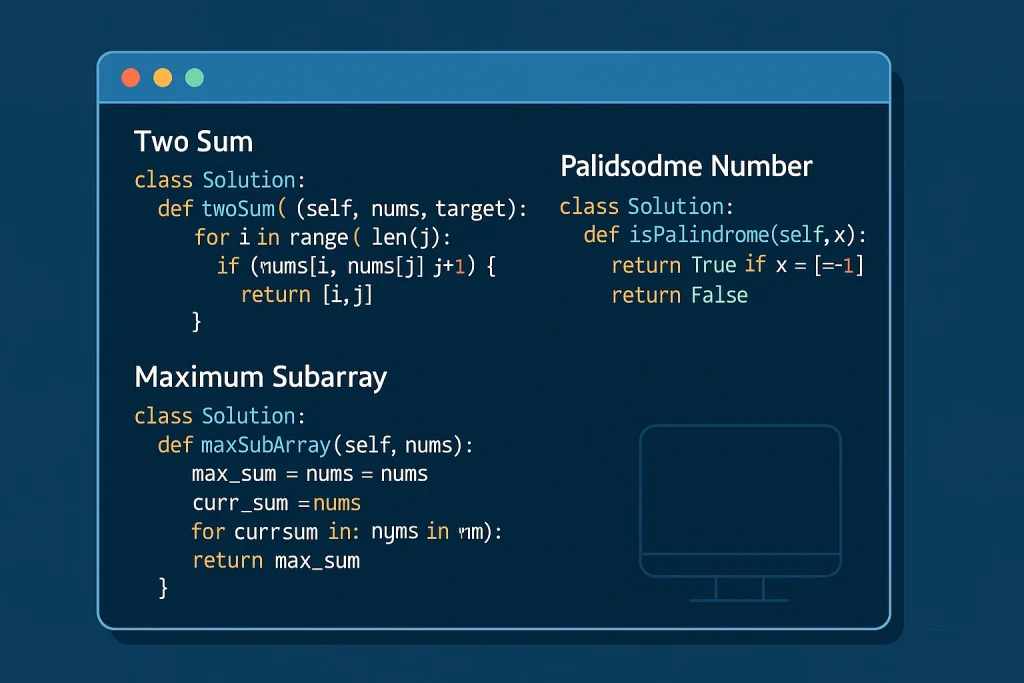If you’ve ever dipped your toes into coding interviews, programming challenges, or the latest technology trends, you’ve likely stumbled upon the name LeetCode. But perhaps you’ve asked yourself and why is everyone in tech talking about it?
At its heart, it is more than a coding practice platform—it’s a gateway to better opportunities. From aspiring developers to seasoned engineers, countless people sharpen their skills, prepare for interviews, and join a global community of problem solvers. I still remember the first time I logged on. I thought it was just another site for coding questions. But after a few weeks, I realized it was more like a gym for the brain—every challenge stretched my logic and made me stronger as a developer.
What is LeetCode?

The answer is: it’s your practice ground, mentor, and test lab all rolled into one. It doesn’t matter if you’re just starting your journey or aiming for a FAANG-level job. In fact, many developers describe LeetCode as the bridge between theory and practice. Reading a textbook might teach you the basics of recursion or binary trees, but solving those problems on LeetCode forces you to apply that knowledge in practical, sometimes stressful, scenarios. That kind of preparation is invaluable when you’re under the pressure of a timed interview.
What makes it stand out even more is its versatility. The platform isn’t tied to a single programming language—you can choose from Python, Java, C++, and many others. This flexibility means you can strengthen your problem-solving skills without being locked into one stack. Additionally, its discussion forums are full of real stories, tips, and solutions from people who have successfully landed jobs. It feels less like a solitary study tool and more like a supportive global classroom.
Breaking Down LeetCode
Let’s go deeper and break down what makes LeetCode stand out:
Premium Features
This unlocks curated company-specific questions, meaning you can practice problems that are known to appear in interviews at companies like Google, Amazon, or Microsoft. For serious job seekers, this is gold. Premium also provides advanced resources such as detailed explanations and mock tests that go beyond the basics, giving users an edge when preparing for elite opportunities.
Coding Problems
These are carefully organized into categories—easy, medium, and hard—so learners can start from the basics and progressively push their limits. Problems cover topics like algorithms, data structures, databases, and even system design. Over time, these challenges help transform theoretical knowledge into practical problem-solving power.
Mock Interviews
LeetCode also offers simulated interview sessions, which replicate the structure and pressure of real hiring processes. You can attempt timed challenges, get immediate feedback, and see how you perform under constraints. This is especially valuable because it helps you not just solve problems but also practice communicating your thought process—an essential skill in technical interviews.
Contests
Weekly and biweekly contests that draw coders from around the world. These timed events test speed, accuracy, and strategy, pushing participants to think creatively under pressure. Some even land job offers because high rankings in contests catch the eyes of recruiters.
Community
LeetCode thrives on its active community. Developers from all over the world contribute by sharing solutions, tips, and insights. This collaborative spirit means you’re never learning in isolation. If you’re stuck on a problem, chances are someone has posted a detailed explanation or alternative solution.
History of LeetCode
To fully understand we need to trace its beginnings. Founded in 2015, it emerged as a response to the growing demand for structured coding practice. The platform quickly gained traction among students and professionals alike.
Here’s a quick look at its evolution:
| Year | Milestone |
|---|---|
| 2015 | LeetCode founded as a coding practice platform |
| 2016 | Rapid growth in user base, especially in Asia |
| 2017 | Introduction of contests and discussion forums |
| 2018 | Premium subscription launched with company-specific questions |
| 2020+ | Became one of the top resources for interview prep globally |
This journey highlights why it became such a crucial part of the tech hiring landscape. It bridged the gap between theoretical learning and real interview expectations.
Types of LeetCode
Free Version
The basic version offers hundreds of problems and community access. Perfect for students or self-learners starting out without financial commitment.
Premium Version
A paid plan that unlocks company-specific questions, problem sets, and more detailed solutions. It’s a favorite for serious job seekers preparing for companies like Amazon or Microsoft.
LeetCode Contests
These are timed competitions where coders worldwide compete. They’re thrilling, often stressful, but incredibly rewarding. For many, contests become a weekly ritual, sharpening speed and problem-solving skills.
LeetCode Playground
A lesser-known feature that allows users to experiment with snippets of code in a collaborative environment. Think of it as a sandbox for creativity.
How Does LeetCode Work?
So, in terms of functionality? Here’s how it works step by step:
- Sign Up: Create a free account and choose between free or premium options.
- Pick a Problem: Select challenges based on difficulty, topic, or company tag.
- Code Online: Use the built-in editor supporting multiple programming languages.
- Run & Submit: Test your code with sample cases, then submit for evaluation.
- Get Feedback: Instant verdict—Accepted, Wrong Answer, or Time Limit Exceeded.
- Learn & Improve: Study community solutions, discuss strategies, and refine your skills.
This loop of practice, feedback, and improvement is what makes it addictive—in the best possible way.
Pros & Cons
Before you jump in, let’s weigh the strengths and weaknesses.
| Pros | Cons |
|---|---|
| Vast collection of problems | Can feel overwhelming for beginners |
| Recognized by recruiters | Premium features require payment |
| Realistic interview preparation | Competitive environment may feel stressful |
| Strong community support | Not all explanations are beginner-friendly |
| Multi-language support | Focuses mainly on algorithms, less on design |
Like any tool, it’s most powerful when used consistently and with the right mindset.
Uses of LeetCode

The true answer lies in how people use it. It’s not just for practicing problems—it has become an integral part of professional growth, shaping careers and even academic pathways.
Interview Preparation
Job seekers practice real company-tagged questions, boosting confidence and performance during interviews. Instead of feeling blindsided, candidates walk into interviews with a sense of familiarity, having solved nearly identical problems beforehand. Many professionals even credit their dream jobs to months of consistent LeetCode practice.
Skill Development
Students use it to master algorithms and data structures, the key building blocks for software development. Unlike traditional classrooms, LeetCode provides instant feedback, allowing learners to spot mistakes and refine their logic quickly. It transforms abstract concepts into practical applications.
Competitive Coding
Many programmers join contests to test themselves against global talent. It’s like a sport for the brain—fast-paced, challenging, and exhilarating. These competitions sharpen speed, adaptability, and resilience under pressure, skills that translate directly to real-world engineering tasks.
Networking
Through forums and discussions, developers share insights, build networks, and learn collaboratively. For beginners, reading expert solutions is like getting a free masterclass from seasoned engineers. It also fosters mentorship, as advanced coders often guide newcomers.
Academic Use
Some universities now recommend LeetCode as part of coursework, integrating its problems into their curriculum. Professors view it as a way to bridge theory with hands-on practice, giving students a competitive edge before entering the workforce.
Resources
- LeetCode.com: Official LeetCode Platform.
- GeeksforGeeks: LeetCode Practice Problems.
- InterviewBit: LeetCode Alternatives.
- W3Schools: Data Structures and Algorithms.
- Medium: LeetCode Problem-Solving Strategies.
